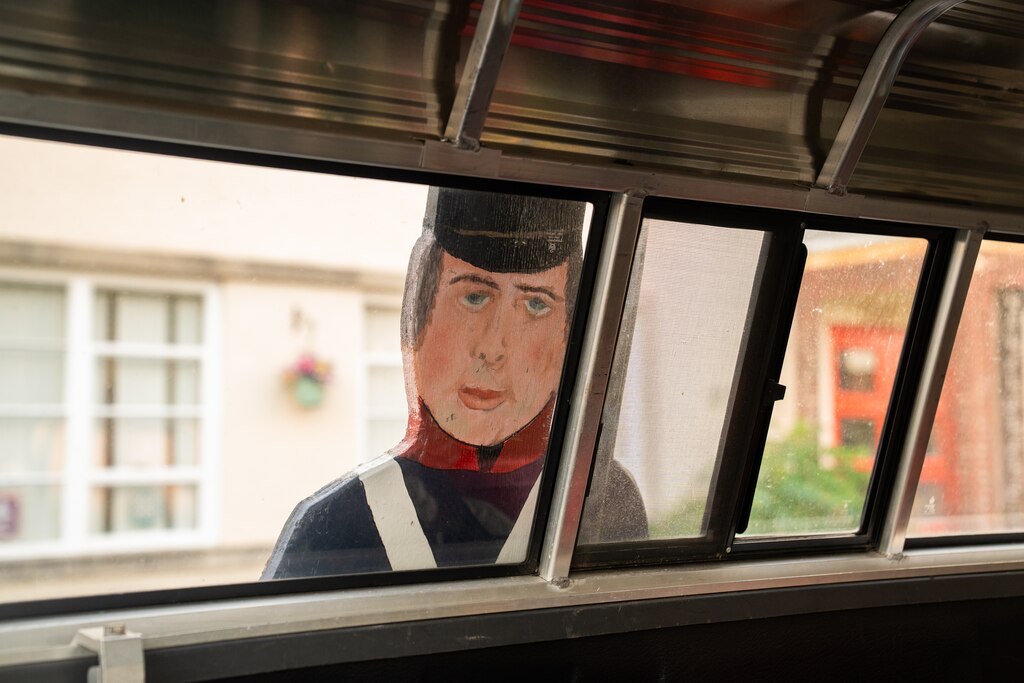It’s not often you spot a young man sporting a pair of pink Air Jordans while cradling a musketoon — the standard early 19th century British infantry firearm — affixed with a bayonet.
On a muggy August evening far too humid for the wool overcoat he wore, Tristan Doak gripped his replica “Brown Bess,” the nickname for his musket, and stood at attention.
“Combined company of American and British forces, form up!” cried Amanda Nebel.
Nebel, Doak and half a dozen other members of the Dundalk-Patapsco Neck Historical Society gathered recently to drill in a church parking lot in preparation for reenacting The Battle of North Point — the initial clash between British and American forces in the Yankee troops’ defense of Baltimore during the War of 1812.
Nebel, co-chair of the Defender’s Day Committee, which organizes the event, explained that the battle on Sept. 12, 1814, was the beginning of a decisive turning point in America’s second — and often forgotten — war for independence.
“The defense of Baltimore is a great show of people coming together and defending their home,” she said. “You had militia, you had regulars, you had Navy, you had Army, you had slaves, you had free Blacks, you had everybody come together.”

The local nonprofit is hosting its annual Defender’s Day at North Point celebration beginning at 10 a.m. Saturday at Fort Howard in Edgemere. The weekend of festivities will feature everything from the reenactment to cricket games and a mock demonstration of an amputation in the medical tent.
About 17 miles up the Patapsco River, Fort McHenry marks Defender’s Day with a weekend of events beginning Sept. 12-14.
This year’s North Point reenactment will be Doak’s first. He’ll portray a British soldier on the battlefield and work at one of the tables as a fur trapper, after the smoke from the gunpowder clears.
Nearly 40 years of Defender’s Day
The War of 1812 was a three-year fight between the United States and Great Britain over trade, the young nation’s westward expansion and the forced conscription of Americans into the British Royal Navy.
The Battle of North Point began in the early-morning hours of Sept. 12, 1814, when about 5,000 British troops under the command of Maj. General Robert Ross landed on the North Point peninsula and began marching toward Baltimore.
About eight miles north of where they landed, the British troops were met by about 3,000 Maryland militiamen, according to a National Park Service online history. Ross was mortally wounded during the fighting. British troops resumed the march the next day, but stopped when they saw American forces assembled at what is now Patterson Park.

Afterwards, the British failed to take Fort McHenry despite a 25-hour bombardment, and ultimately withdrew from Baltimore. The Americans’ defense of Fort McHenry inspired lawyer Francis Scott Key, who was trapped aboard a British ship negotiating for a prisoner’s release, to pen a poem that became the national anthem, “The Star-Spangled Banner.”
Nebel explained that a group of volunteers — sometimes ragtag, sometimes robust — has been supporting the annual North Point reenactment since 1986.
She stressed that the nearly four decades of commitment is important because so many folks in Baltimore City and County don’t know about their community’s role in history.
“Maybe you know about Fort McHenry,” Nebel said, “But even here you don’t learn a lot about [the War of 1812], and people wandering around here don’t know what happened in their backyards sometimes.”

Serving the community, preserving history and educating the next generation comes naturally to Jeremy Cook.
The Dundalk native’s great-great-great-great grandfather, Henry Cook, traveled by horse and buggy from the Eastern Shore to join the Maryland militia in defending Baltimore at the Battle of North Point.
“Honoring our ancestors, who were in all of these wars, is so important,” he said.
In the war room
On the second floor of New Light Lutheran Church in Dundalk, the Defender’s Day Committee volunteers have assembled a war room of their own.
Props, wooden soldiers, signs and photographs are scattered across the room.

Ghosts from reenactments past line a corkboard full of newspaper clippings focusing on the North Point Defender’s Day founder John “Buzz” Chriest, who died in 2023.
“Buzz would’ve talked your ear off,” Nebel said.
The reenactors have gone through several iterations since Chriest started the organization as a Boy Scout troop.
Nebel serves as the lieutenant of the crew, now aptly named Asquith’s Sharpshooters — after a band of American riflemen from the War of 1812. Baltimoreans believe that two of those original members, teenagers Daniel Wells and Henry McComas, were responsible for killing Ross.
She leads the company with patience for newcomers, reverence for old-timers and excitement for this year’s attendees.
“We want them to come for the smoke and fire and stay for all the other stuff, too,” Nebel said.

19th-century medicine, weapons and more
Olafur Nelson is the go-to guy for all of your armory, pyrotechnic and 1800s medical practice needs.
In addition to repairing, maintaining and transporting the reenactors’ various replica muskets, the company’s single cannon and a hefty amount of gunpowder, Nelson also has an alter ego: “Dr. Shadyfellow.”

During the weekend, Dr. Shadyfellow sets up a field hospital on the event grounds with era-appropriate surgical tools to give an accurate depiction of a mock amputation — often the only option after being wounded in combat.
“To facilitate demonstrations,” Nelson explained. “I will get a full-sized pig from the local Amish farmers which we will, uh, induce gunshot wounds to create the proper effect.”
For those seeking a less gruesome depiction of 19th century life, the Defender’s Day Committee also has prepared a host of family-friendly games for folks to try out.
This ranges from traditional wooden block toys like Jacob’s Ladder to a volunteer from Milwaukee who will spend his second year teaching attendees how to play cricket.
Doak is excited for it all — the battle, the gore and all of the seemingly mundane, but to him, exciting, daily aspects of life back then.
“I think it’s important that we look back on what we were,” he said, “so that we can continue to grow and improve as a country, as individuals.”




Comments
Welcome to The Banner's subscriber-only commenting community. Please review our community guidelines.